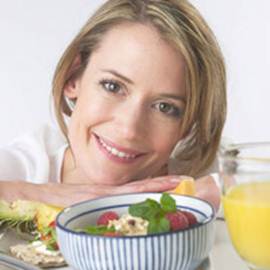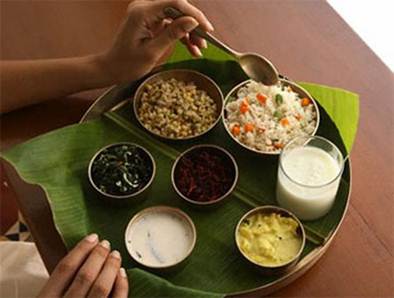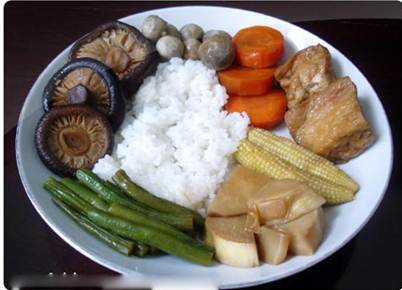Is vegetarian diet the
optimized way to protect the healthy?

You
should not keep an absolutely vegetarian diet so your body will lack of
nutrients.
Many people believe that a vegetarian diet
can prevent many diseases, but in fact, many complete vegetarian still suffer
from chronic diseases such as hypertension, diabetes, cardiovascular disease,
and dyslipidemia. So is vegetarian the optimized way to protect your health?
In the opinion of many people, vegetarian
means only eating vegetables, fruits, and completely eliminate the animal original
foods. Compared with complicated diet, vegetarian diet with vegetables has many advantages. Protein in
vegetal foods is usually absorbed and digested more easily, less allergic and more easily for your to use.
Moderate amount of protein in the portion
of vegetarians is also benefit for health because it reduces the risk of gout,
calcium excretion via the kidneys, the risk of dementia in late stage of life.
Fat in vegetarian diet is vegetal fats, unsaturated fatty acids, which are
useful for the body and absolutely no exogenous cholesterol; therefore that
does not cause adverse effects on the cardiovascular system as animal fats.
A vegetarian diet often contains a high component of vitamins and
minerals due to lots of fruits and vegetables; coming with these important micronutrients is ingredient of herbal micronutrient which are effective on protecting body cells, against free
radicals, aging bodies, and cancer.

If
keeping vegetarian diet in long time, your diet should be accompanied by milk.
The amount of fiber in vegetarian portion
is also higher that is very beneficial conditions for regulating
gastrointestinal activity, decreasing absorption of disadvantage components
into body from gastrointestinal tract, preventing cancerous diseases of rectum
and colon, hemorrhoids, and varicose of legs or arms.
However, vegetarian diet also has
disadvantages which need to talk. Protein in the vegetal foods is plentiful,
but not enough essential amino acids, especially the amino acids can affect to
physical development such as lysine, methionine, threonine, and tryptophan.
Vegetal fatty does not include exogenous cholesterol but can contain saturated
fatty acid which is effect on stimulating body to establish endogenous
cholesterol, especially low-density cholesterol is not good for cardiovascular
system. This type of fat is present most in coconut milk and vegetal butter as
margarine, shortening.
In other vegetal foods can also contain anti-nutritional components that block absorption of other nutrients such as tannins, fiber too high reduce absorption of iron; protein in soybeans, phytale in powder or
oxalate in vegetables increase the
absorption of iodine and calcium.
The ability of anemia in total vegetarians
is usually high by lack of both folic acid, iron and
especially vitamin B12. Vitamin B12 and zinc, an important mineral for body’s development and operation, are only in animal foods.
So, if keeping
vegetarian diet in long time, your
portion should be accompanied by milk, and for children should be in addition to eggs instead of just
using vegetal foods. In the case
of seasonal vegetarian diet, you can also use whole vegetal foods but keep in mind to combine the components of portion in order to balance nutrients’ concentration and help
the body digest, absorb best.
Add beans when cooking
rice or soup, eat rice with sesame and
nuts, or drink a cup of cereal after meal is a good way to balance
protein. Avoid combining foods which provide calcium and iodine, such as tofu, sesame, seaweed with
vegetables including much oxalate
such as spinach, radish, cauliflower in the diet.
Limit to use coconut milk in food processing especially for the elderly or those
who are in high risk of chronic
diseases. The common dishes in vegetarian meals as soya cheese, soya sauce, vegetable pickles, or pickles and salts are foods with very
high content of salt. These foods should be used restrictively and should not be for elder people who had high blood
pressure, heart disease, kidney disease or diabetes.
Processing vegetables to tasty dishes contributes to increase appetizer,
but has the
disadvantage on nutriments. The
tendency of frying foods in oil during processing can cause to rise the rate of fat in portion that is not
helpful for those who need less energy diet.

Processing through many stages also damage to
vitamins which are decomposed easily such as vitamin B2, B3, B6, B9, and C in
foods.
Processing through many stages also damage
to vitamins which are decomposed easily such as vitamin B2, B3, B6, B9, and C
in foods. Beside the vegetarian meals need to cook delicately for parties, you
had better keep a vegetarian diet in as simple as possible including vegetable
soup, fried tofu or stir-fried mixed. Because nutrients are preserved in the
best condition and do not produce harmful components for health.
With the long time
vegetarians, to solve the problems
of lack of nutrients which are not found in vegetal original foods, today people tend to use foods that have been
added these micronutrients, or
supplement drugs.
If you're young and healthy, you should have vegetarian diet only 1-2 days to change the taste, and perhaps it is not necessary to measure
the ingredients in the diet. But if your vegetarian period lasts over a week,you should be so interested in balancing your diets to ensure the body nourished by the best reasonable diet.
Looking from the perspective of nutrition,
if you skillfully balance nutrients through selecting and processing dished
sustainably, the non-continuous vegetarian diet (3 months per year or one week
per month) actually is a good diet for protecting your health.